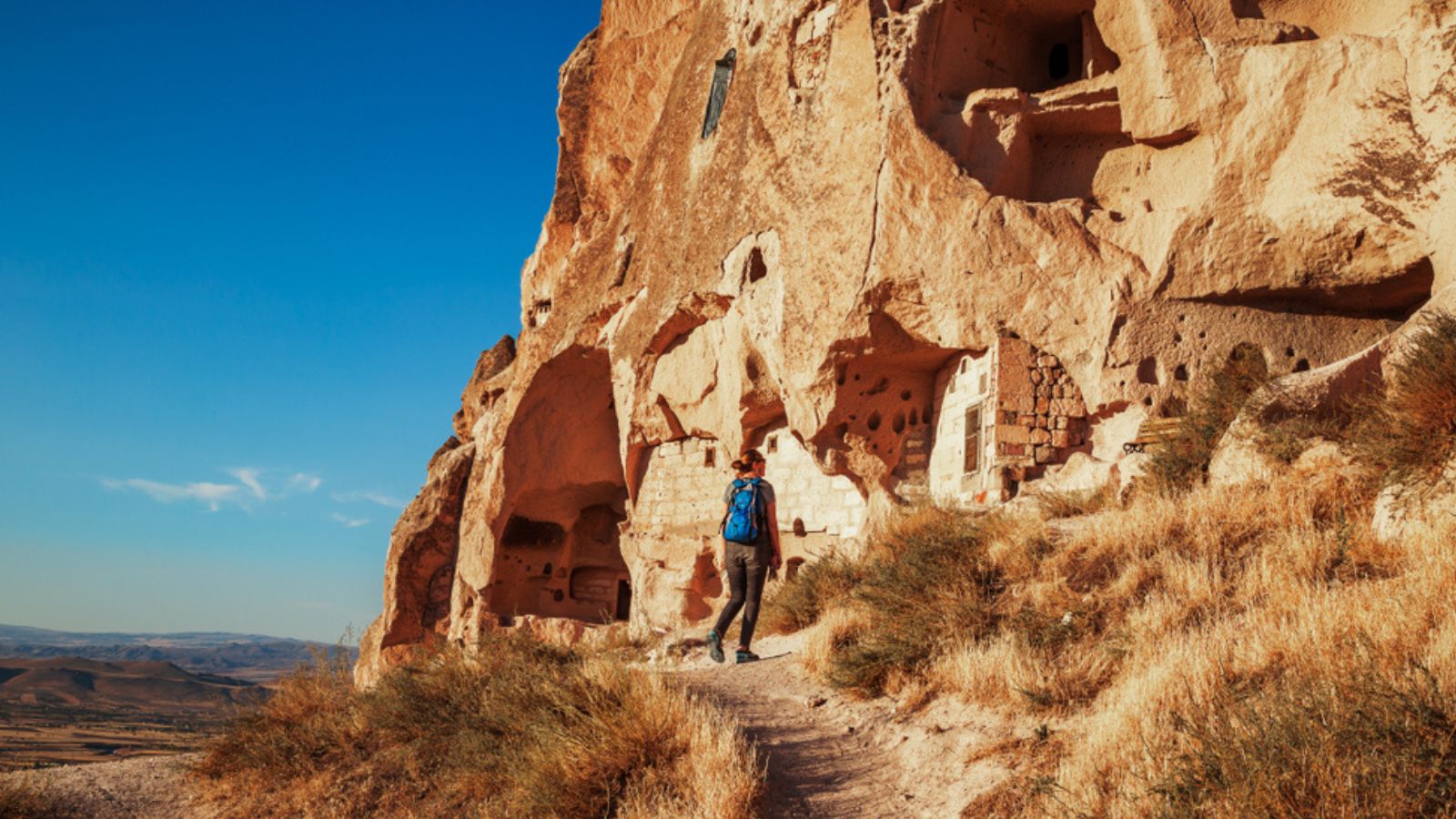Decision-makers in Travel Tech are currently contemplating which trends will shape the industry in the upcoming year. Online Travel Agencies (OTAs), in particular, are eagerly anticipating this year’s travel season, which looks set to be a big one. While high inflation and a looming recession are on the forecast, travelers are not deterred. In 2023, total tourist spending is projected to exceed $1.4 trillion USD globally, according to Euromonitor.
With this in mind, it’s worth considering which themes will impact how people choose to travel and what their preferences might be this year. Undoubtedly, with the lasting impact of the pandemic, the world has changed irreversibly. As a result, travelers' attitudes have shifted in significant ways, which OTAs should be aware of.
We reviewed the latest travel trend reports and research studies to identify the leading motives of global travelers in 2023. It turns out that there are two overarching themes that will set the stage for the year ahead. Our analysis concludes that most OTAs across the globe could benefit greatly from leveraging these accelerating consumer trends.
How, exactly?
We will explain below by providing three concrete best-practice examples from the global travel-booking scene.
For starters, let’s take a closer look at the most pressing trends shaping the travel plans of consumers in 2023. With these in mind, OTAs and travel-booking startups can plan ahead when it comes to connecting and engaging with prospective clients.
As our research shows, two consumer trends stand out the most, and both trends are closely related to rising sustainability awareness in the travel industry. This is something we have extensively covered in the past, as the sustainability movement provides a massive commercial opportunity for travel providers like OTAs going forward.
TREND #1: Travel-to-Disconnect
As many facets of our lives have rapidly gone digital during the pandemic, travelers are more likely to seek out off-grid and off-the-beaten-track travel experiences in 2023. This preference relates to the choice of travel destinations as well as the timing of planned holidays.
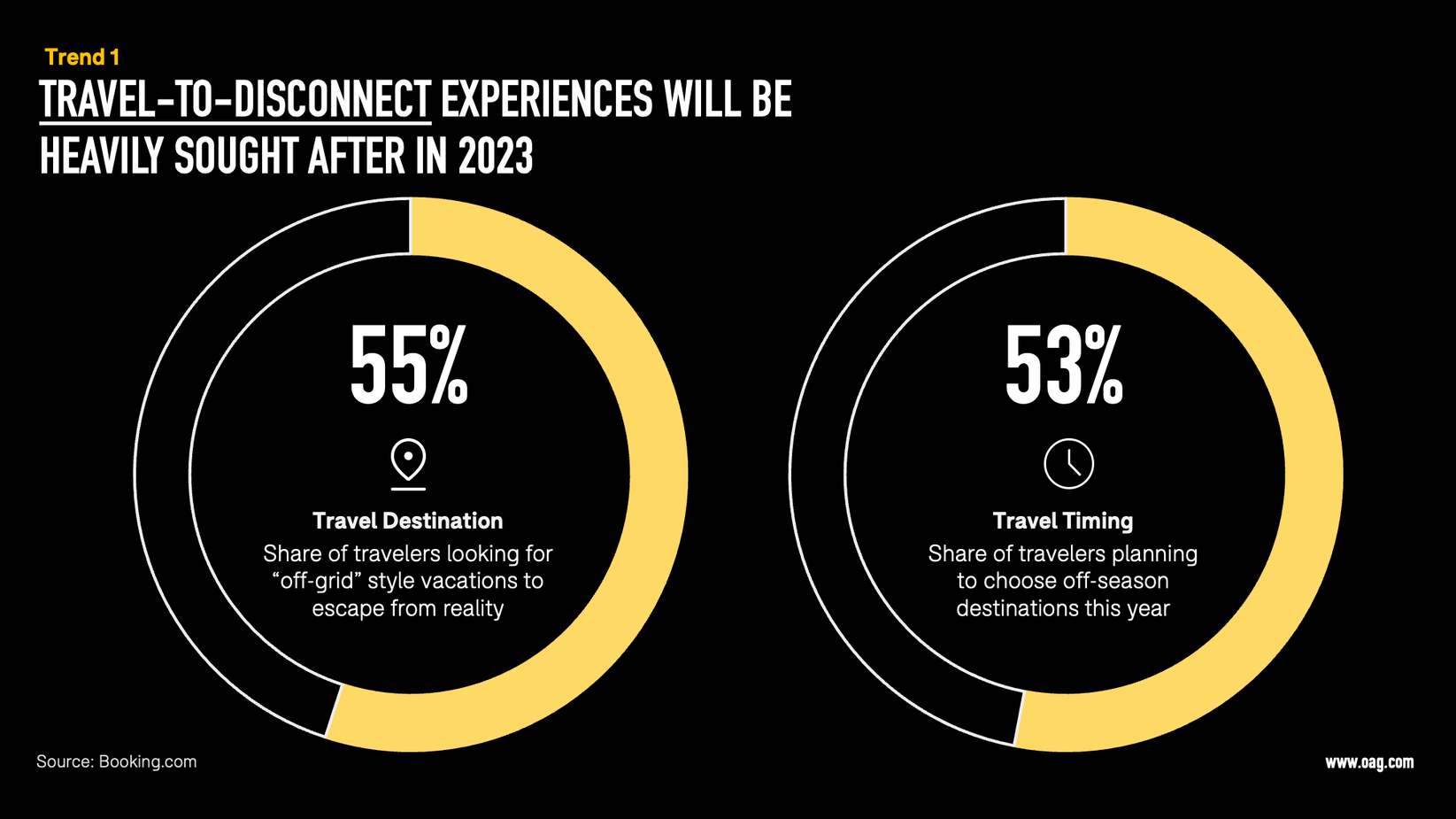
Let’s dive deeply into both factors, starting with travel destinations.
Off-Beat Travel Destinations
Once lockdowns and other pandemic-related restrictions eased off, people became restless. With the rise of the work-from-home revolution and the 'always-on' digital lifestyle that connects us with colleagues, friends, and family, many people now want to disconnect. This desire translates into their preferred choice of travel destination. As a result, it appears that going 'off-grid' is more sought after than ever before, which is a major travel trend for 2023.
According to Booking.com’s Seven Predictions for the Reimagination of Travel in 2023, more than half of travelers said they are looking for 'off-grid' vacations to escape from reality this year. The demographics most interested in this option are people with a steady income as well as millennials — two highly attractive target groups given their purchasing power.
So, what does this mean exactly? We can anticipate that travelers will be attracted to experiences that are earthly and eco-friendly. With this, accommodations fitting the bill are sure to spring up and entice burnt-out city dwellers searching for simplicity.
Simplicity, however, doesn’t necessarily equate to budget travel.
Interestingly, many folks might take this opportunity to splurge on a luxury escape experience. In fact, 48% of respondents said they are looking to combine an “off-grid” escape with indulgent luxuries. Put differently, disconnecting doesn’t mean sacrificing the finer things in life.
When looking at the top trending destinations for 2023, it’s clear that 'off-grid' experiences with a focus on nature are currently the crème de la crème of the travel industry. This new sensation is further evidenced by another Booking.com survey, which found that seven of the top trending destinations in 2023 are connected to nature escapes. These include beautiful landscapes such as the Adriatic Coast, the Mexican rainforest, and Mount Kinabalu in Malaysia. These results are also backed by an Airbnb analysis of the top trending accommodation categories on its platform, which are spearheaded by tropical, countryside, cabin, lake house, and other idyllic nature-related bookings.
With more clarity on destination preferences, let’s review the timing of travel choices.
Off-Season Travel Timing
As borders reopened and travel restrictions eased over the past year, there has been a frenzy of travelers headed abroad for much-needed holidays. With this, many people were disappointed to find that their destination of choice was heavily crowded—a common phenomenon often cited as revenge travel.
Moving forward, more than half of all travelers (53%) will plan their 2023 trips during off-season booking windows to avoid over-tourism, according to Booking.com’s Travel Predictions 2023. In fact, this segment of travelers will even choose longer routes just to stay away from the swathes of people.
Given this, many in the travel industry anticipate that off-season travel periods will be busier than usual. Also, the inverse will occur: the busy season will quieten down a bit. However, it’s important to keep in mind that travelers' intentions do not always correlate with actual (booking) behavior. In any case, OTAs promoting unique travel experiences outside the major travel windows, like the summer school break, could see higher demand this year.
TREND #2: Hyper-Climate-Awareness
When planning their next vacation, travelers want to make more sustainable decisions. This isn’t a new trend per se, as climate change and the environment have been top of mind for travelers for quite some time. We have reported on this situation in the past. You can check out our three-part analysis of how OTAs can work towards a more sustainable travel future.
However, 2023 is set to be the real tipping point for sustainable travel demand.
On top of the ever-increasing demand for more sustainable travel options, people are specifically asking for greater transparency and education on this matter than ever before. This is a trend that is found in almost all of the latest traveler surveys.
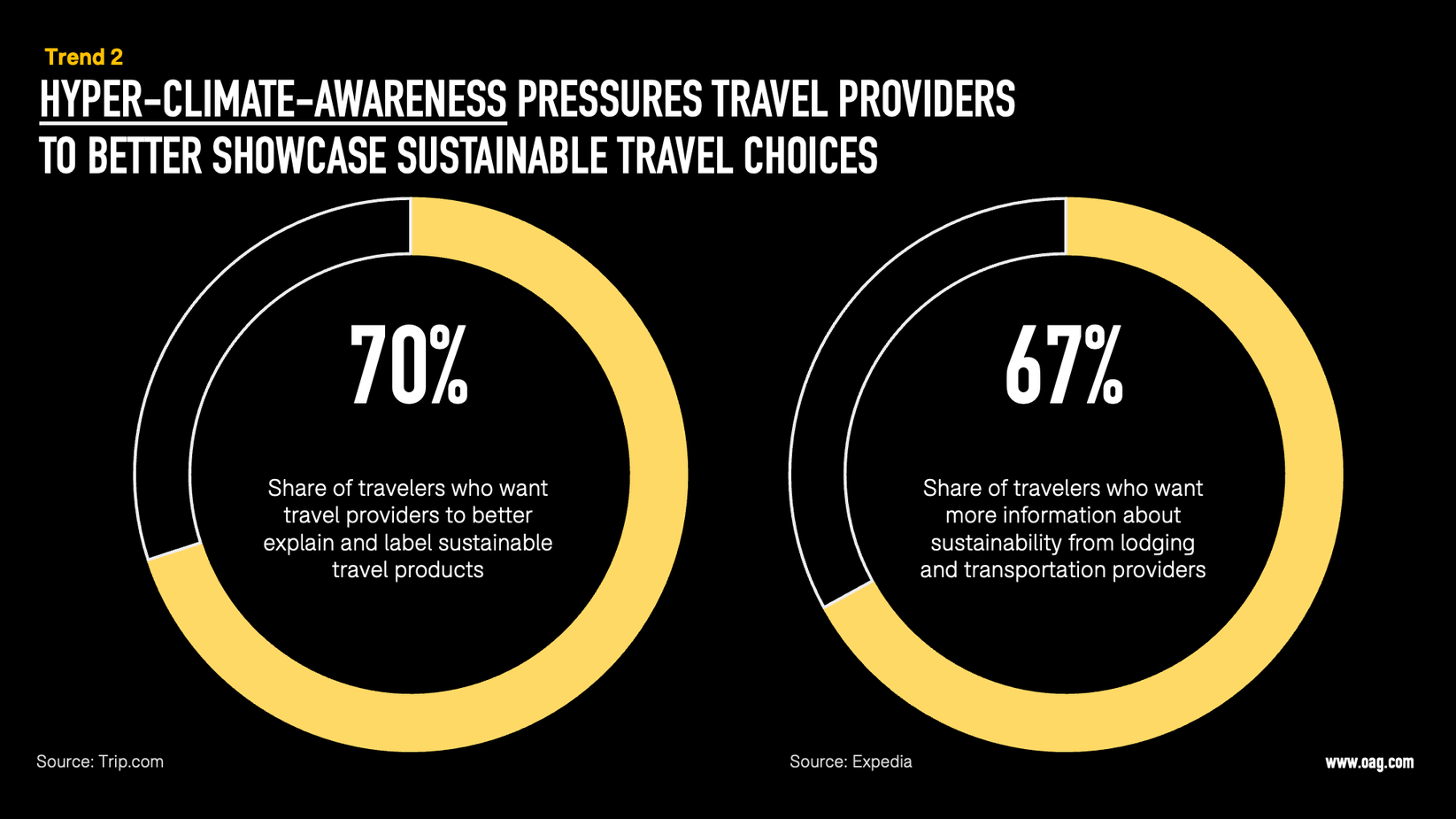
In fact, survey respondents repeatedly shared that transparency and visibility (surrounding the climate impacts of travel offerings) play a significant role in decision-making over which OTA or travel provider to choose.
- In a Trip.com survey, as reported by Skift, 70% of respondents shared that they want travel companies to better explain and label sustainable travel products.
- Furthermore, two out of three consumers said they want more sustainability information from lodging and transportation providers to empower them to make informed decisions, according to Expedia.
As a result, it is imperative that OTAs and other travel-booking providers understand that a wide range of sustainable travel offerings is a must.
Traveler Trends Present Great Opportunities for OTAs
It’s never a bad idea to keep your finger on the pulse. With these traveler trends in mind, OTAs of all sizes have the power to unlock new segments and opportunities for growth.
So, how exactly can travel providers like OTAs best address these traveler needs?
Well, for starters, it’s time to embrace the new order of things. Thus far, the majority of OTAs around the world remain hesitant to present a transparent selection of sustainable travel offerings. This trend will only become more important in the years to come. So, it’s not too late to jump on the bandwagon.
As we have previously shown, most major OTAs are getting better at educating their customers about the sustainability impacts of travel. This can come, for example, in the form of a dedicated blog section on company websites. However, more often than not, OTAs don’t offer sustainable travel packages as clearly defined booking options yet.
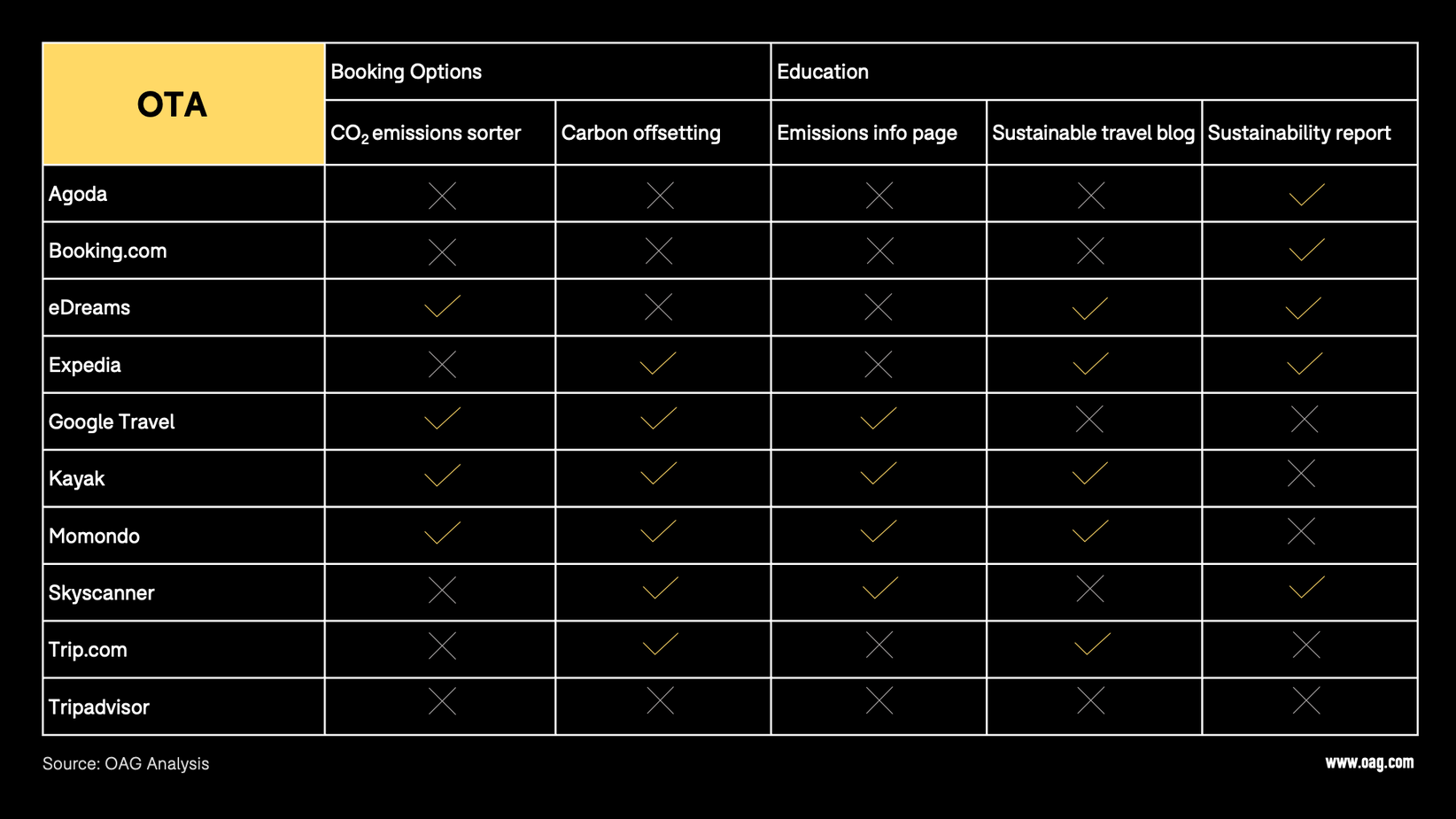
What does this mean?
As people plan their next trip abroad, when reviewing search results, it can be exceedingly difficult to identify sustainable travel choices. If the option isn’t available, travelers are unable to take advantage of it.
Here are two examples of the gaps that exist on many booking websites:
- At present, when reviewing travel options, such as hotel properties or flights on major OTA websites, consumers are unable to filter search results by the lowest CO2 impact.
- As well, it is currently next to impossible for travelers to separate sustainable from unsustainable hotel choices. Booking.com added a 'Travel Sustainable Level' for each hotel property on its platform. This was the first attempt to provide customers with information related to sustainability. However, it wasn’t quite granular enough to offer real transparency.
Frederic Lalonde, the CEO of Hopper, recently admitted that many in the industry, including Hopper itself, have not listened to their customers well enough. “You don’t matter, your investors don’t matter, your company doesn’t matter. What your customer needs or wants, whether they know it or not, is the only truth that matters,” he said on the stage of PhocusWire in 2022.
With this in mind, what can OTAs do to better address the growing Hyper-Climate-Awareness of travelers and their specific preference for Travel-to-Disconnect?
Let’s take a closer look at three best-practice examples of companies that are successfully addressing these two trends.
Example #1: Google Travel
Recently, Google launched a dedicated information page complete with a virtual guide and easy-to-use tools on how to travel more sustainably. This page consists of three essential components:
- Where to go
- How to get there sustainably
- Where to stay more sustainably
On top of this, the information dashboard features a simplistic compare-emissions-per-flight calculator. This is an accessible product feature for travelers hoping to make purchase decisions with sustainability in mind.
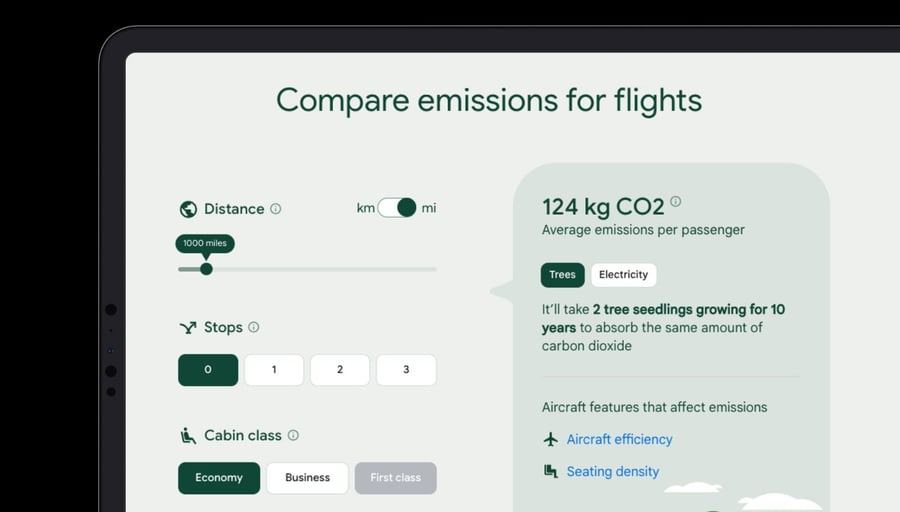
In our view, an information dashboard, such as that of Google, will ultimately be the level of granular information offered by OTAs to their customers. This feature, and others like it, will make up the standard toolbox for travel providers.
Additionally, Google has launched a new search tool for eco-friendly hotels, flights, and train tickets. Already, consumers were able to see estimated carbon emissions on Google Flights. When people searched for hotels, they would find an eco-label on properties carrying certification from a trusted third-party group.

Since October 2022, Google has had an even greater number of tools available to assist consumers in making greener travel choices. With new filters for both flights and hotels, it’s now easier and more seamless to find more sustainable options. For example, people have the option to view only those flights that have lower emissions compared to the average for similar trips. To try this out, you can simply tap the “Low Emissions” filter on Google Flights.
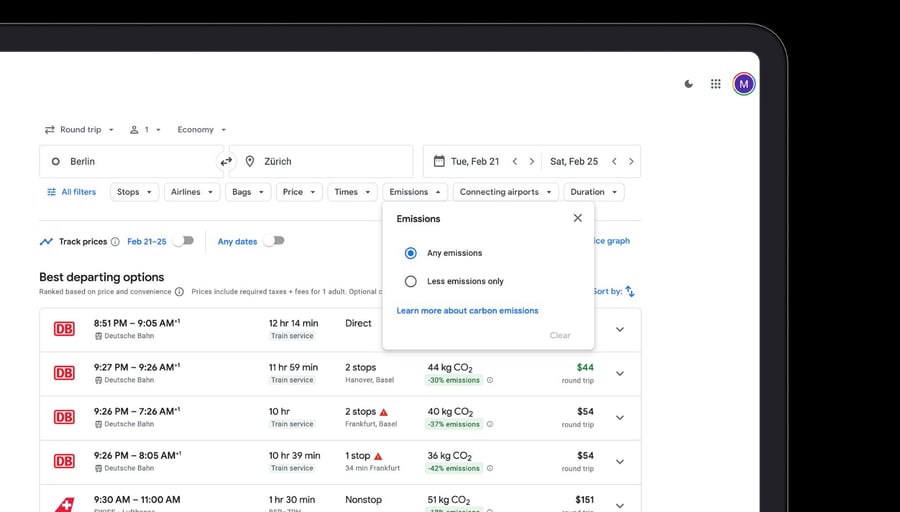
Example #2: Startup Viatu
There are a growing number of startups focusing their business efforts on the provision of sustainable travel offerings. This ecosystem is bringing the dream of a more eco-friendly future closer to reality.
Viatu, a startup based in Switzerland, is one of these emerging players. In fact, the company specializes in niche travel packages to remote, off-the-grid travel destinations across Africa. In particular, Viatu caters to travelers who wish to travel as climate-consciously as possible.
The company is convinced that tourism stakeholders are starting to break the mold and push for progressive experiences. Viatu is leveraging the opportunity to empower tourists to tread lightly while exploring the rich splendors of the African continent.
So, how exactly is the experience of booking travel packages from Viatu different than any other?
Well, the total CO2 emissions associated with each of the travel packages offered by Viatu are prominently highlighted. This provides consumers with greater transparency to make more informed decisions when booking future trips.
More importantly, Viatu offers users a choice of travel destinations and activities with a flexible CO2 emissions filter. This feature takes into account aggregated CO2 emissions generated from hotel stays and road trips.
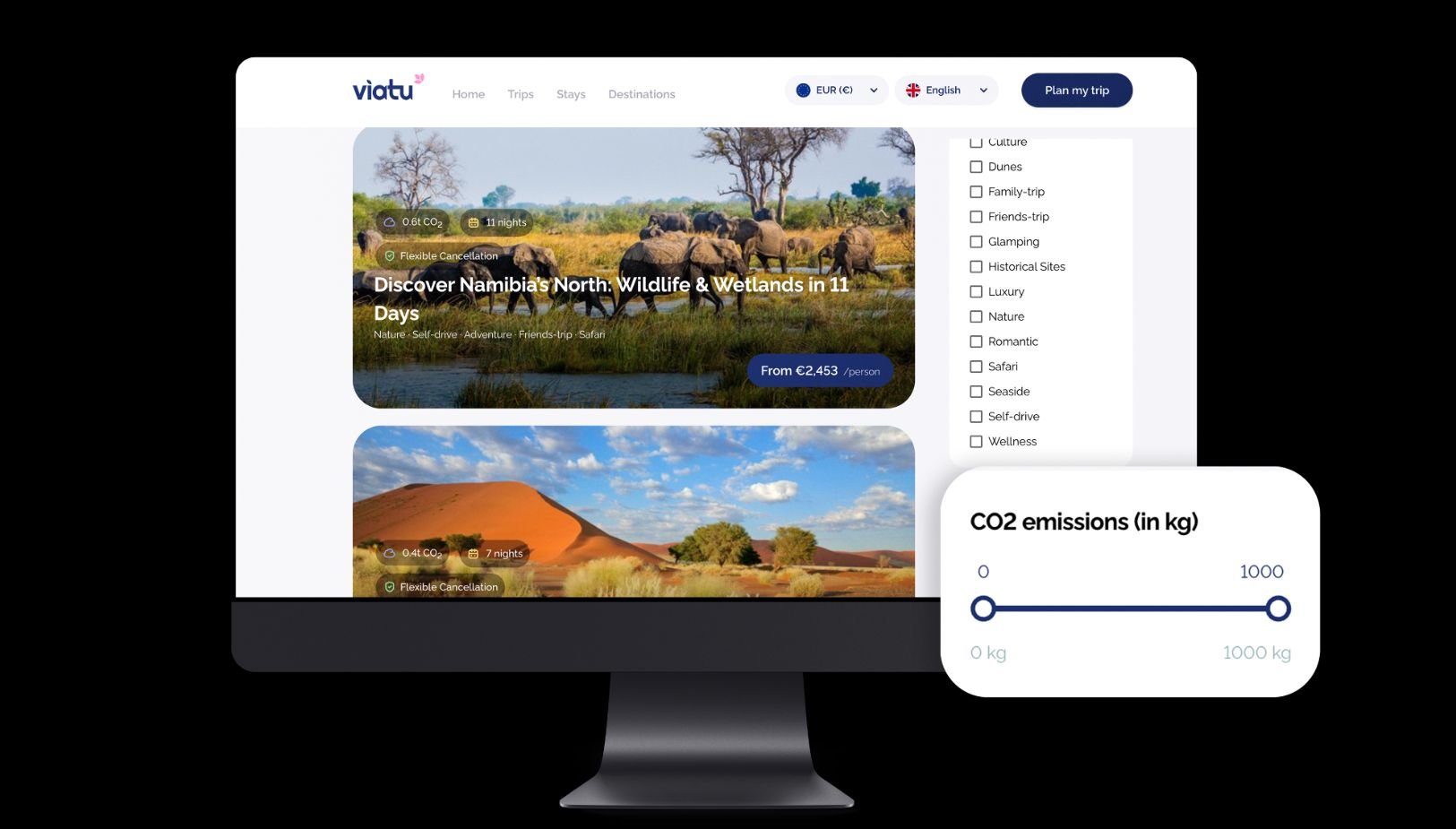
Both of these features are extremely helpful for travelers looking to lower their carbon footprints—something OTAs should consider implementing as well.
Obviously, Viatu is not alone in its endeavor to target more climate-oriented travelers by offering sustainable travel choices more conveniently.
There are hundreds of other travel booking sites like this. A few examples include bookdifferent, Staze, ecobnb, Kindtraveler, Goodwings, Earth Changers, RoomsForChange, Gondwana Ecotours, Responsible Travel, Holiable, and Byway. The latter, Byway, even focuses on flight-free holiday packages across Europe.
Example #3: Intrepid
The third and final example of a company upping the ante for sustainable travel offerings is Intrepid. The OTA has focused on the provision of sustainable travel packages, calling itself “The world’s largest adventure travel company.” Since being founded in 1989, Intrepid has taken a purpose-driven approach. Since 2010, the company has been carbon-neutral. To achieve this, Intrepid carbon offsets all of its trips directly—a move many OTAs continue to refuse to make. As well, Intrepid has a seven-point commitment plan that supports its own Climate Emergency declaration.
Clearly, this OTA has been ahead of the game for some time now, a shining example for other travel providers to emulate. In fact, Intrepid is the first global tour operator with verifiable science-based targets through the Science Based Targets initiative, which aims to limit global warming to 1.5C in the next decade. Intrepid is known for prioritizing the balancing of profit and purpose - some call them the Patagonia of travel.
In particular, we admire that Intrepid provides those using its booking platform with the opportunity to choose potential travel destinations by theme. Many of these themes resonate with travelers looking for off-grid experiences.
This is what sets Intrepid apart from the rest - the choice to filter travel offerings by 'purpose' is a distinguishing feature that is far different than those of most OTAs that only offer price and hotel-star filtering.
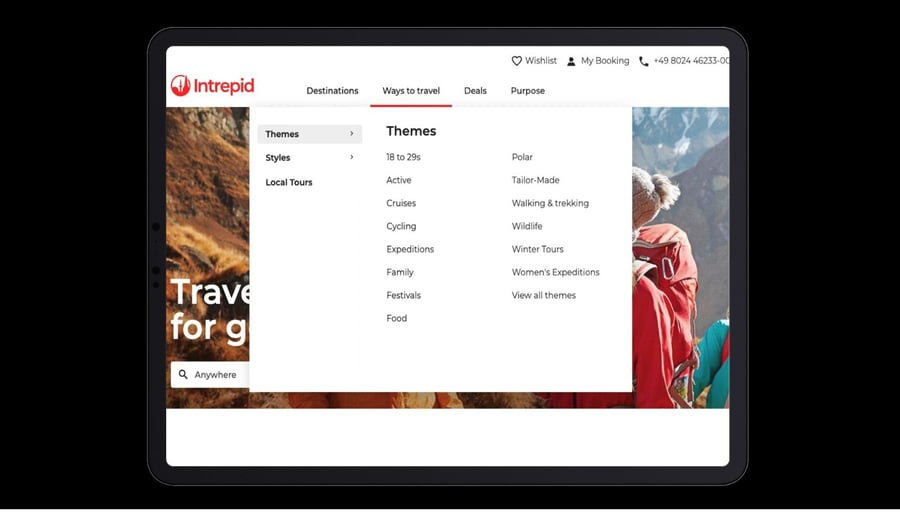
It’s Time to Act
These are three poignant examples of OTAs that are leveraging the sustainable travel trend.
With the aforementioned features part of their respective platforms, these travel providers are setting the stage for what’s to come. Sustainability isn’t going anywhere. Instead, it will be at the forefront of consumer decisions moving forward.
With all this in mind, right now is a great time for OTAs to find innovative ways to differentiate themselves from their competitors. There is ample opportunity for travel providers to go beyond merely sharing the cheapest options available. While nothing is written in stone, it’s no secret that a growing segment of customers is committed to traveling more sustainably and paying a few extra bucks to do so.
OTAs and Sustainability Blog Series:
Part 1: How can OTAs work towards a more sustainable travel future?
Part 2: Explore the products and services offered by major OTAs for sustainable travel bookings
Part 3: How can OTAs better serve their customers in making sustainable travel choices?




.jpg)

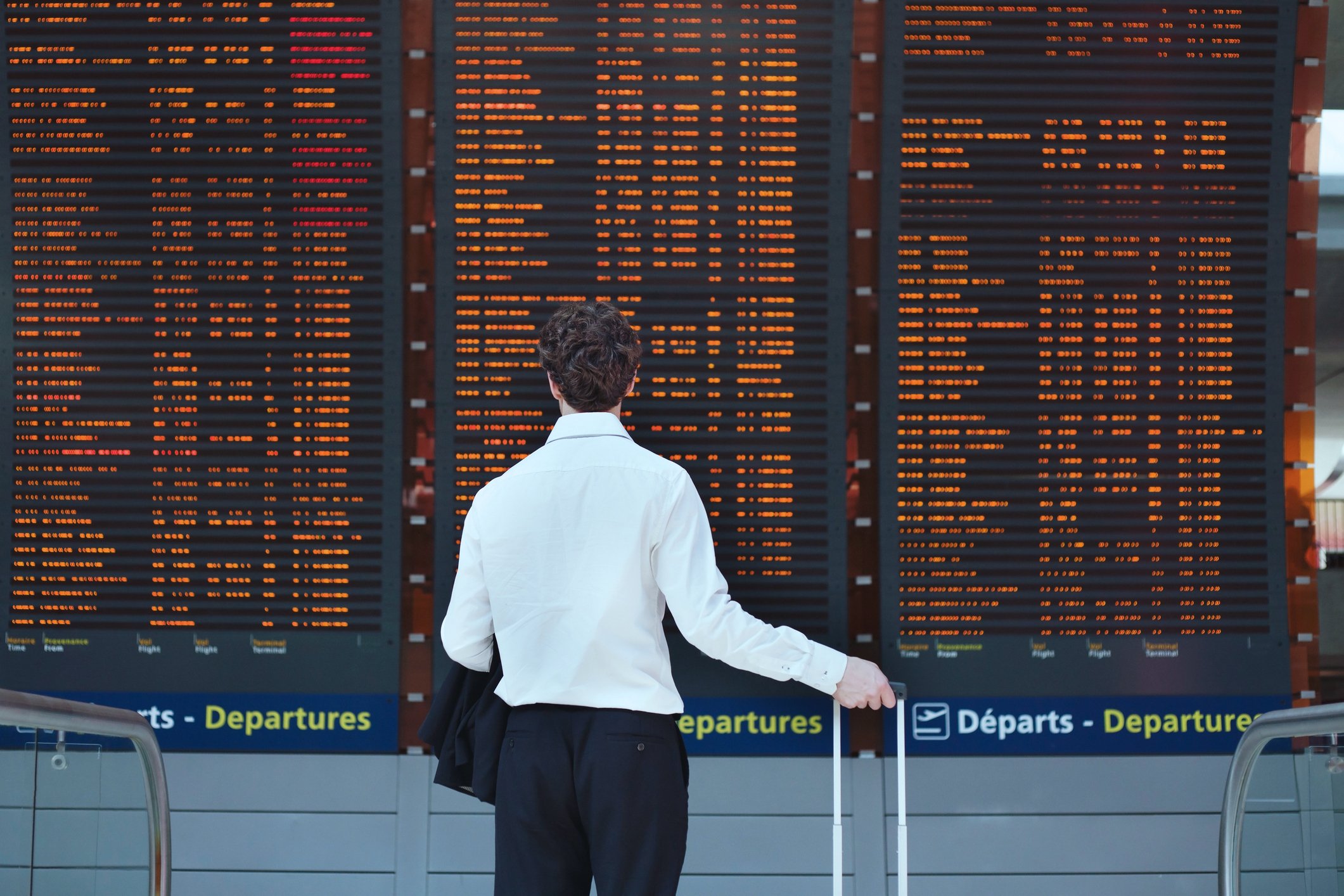



.png)







